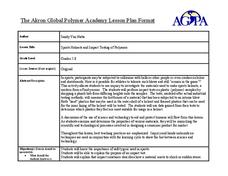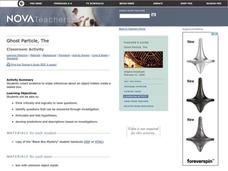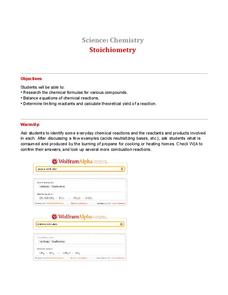LABScI
Kinematics: The Gravity Lab
Falling objects can be brutal if you don't protect your noodle! Scholars explore the motion of falling objects through measuring short intervals to determine if the distance traveled varies with time. Building off of this, scholars...
Curated OER
Matter
Eighth graders explore chemical reactions and their products. They define a chemical reaction and describe the characteristics of a chemical reaction. Students classify chemical reactions.
Curated OER
Balancing Chemical Equations
Ninth graders explain how atoms and molecules form different substances during chemical reactions and how these processes require losing, gaining or sharing electrons. They correctly write chemical formulas and show how a balanced...
Curated OER
Ionic Chemical Formulas Days 1 & 2
Students study polyatomic ions and write binary and ternary ionic chemical formulas. They explore putting together different monatomic ions and coming up with as many chemical formulas as possible. They play a game similar to memory...
Curated OER
Automobile-Accident Reconstruction
Students investigate an accident and relate it to math. In this trigonometry instructional activity, students measure the accident scene, the friction produced, and the speed from the skid marks. They create a poster of their findings.
Curated OER
Collisions and Momentum: Bouncing Balls
Students explore the concepts of potential and kinetic energy by bouncing assorted balls on different surfaces and calculating the momentum for each ball. They give examples of collisions and momentum in sports and understand that...
Curated OER
Sports Helmets and Impact Testing of Polymers
Students examine the importance of good quality safety gear. In this investigative lesson, students will tests various polymers, collect data, and analyze the data to determine which polymer is best for safety helmets. They will design a...
Curated OER
Determination of Phosphates
Learners engage in a laboratory lesson in order to increase understanding of the impact of phosphates at the chemical and ecological levels. The lab exercise is completed with the goal of getting them to predict the outcomes and future...
Curated OER
Chemical Bonding
Eighth graders identify the three main types of chemical bonds. In this chemistry lesson plan, 8th graders draw Lewis dot diagrams of elements and determine the bond formed. They create a model water molecule.
Curated OER
Chemistry: Balancing Chemical Equations
Eighth graders practice balancing chemical equations. In this chemistry lesson, 8th graders explain why it is necessary to balance equations. They complete practice worksheets individually.
Curated OER
Photosynthesis and Respiration
Eighth graders differentiate photosynthesis and respiration. In this biology instructional activity, 8th graders draw a diagram explaining these two processes. They answer a quiz after the instructional activity.
Curated OER
Cycles Review
Eighth graders discuss the four major cycles of matter. In this general science lesson, 8th graders decide which of the four is the most important. They share their opinion in class.
Curated OER
The Ghost Particle
Students collect evidence to make inferences about a object hidden inside a sealed box. They think critically and logically to raise questions. Students identify questions that can be answered through investigation. They formulate and...
Curated OER
The Concept of Energy
In this energy worksheet, students read about the discoveries of Galileo and how different philosophers contributed to our understanding of energy. Then students complete 4 short answer questions.
Curated OER
Bouncing Balls
Students work together to examine how different types of balls react to colliding with different surfaces. They discover the difference between elastic and inelastic collisions. They practice calculating momentum as well.
Curated OER
Thermal Energy and Heat Unit
Students explain that heat energy in a material consists of the disordered motions of its atoms or molecules. They know and explain that transformations of energy usually transform some energy into the form of heat, which dissipates by...
Curated OER
Limiting Reagent
Students work in small groups with a small set of 8 nuts and 5 bolts to assemble into combinations of 1 nut: 1 bolt, and 2 nuts: 1 bolt. They explore the outcome and discuss. Then a student mixes two clear, colorless solutions together...
Curated OER
Movement of Objects
Ninth graders investigate motion. In this science lesson, 9th graders conduct experiments on objects to analyze motion and speed. They define motion in everyday life.
Curated OER
Stoichiometry
Students research chemical formulas and balance chemical equations. In this chemical equations lesson students complete a class activity on chemical equations and answer questions.
Curated OER
Olympics
In this Olympics worksheet, students answer multiple choice regarding training at and for the Olympics. Students complete 5 questions.
Curated OER
Impulse/Momentum Lab
Students investigate the relationship between force and momentum using motion detectors and sensors. In this physics lesson, students graph experimental results. They calculate impulse using the area under the graph.
Curated OER
"Water, Water Everywhere and None to Drink"
Ninth graders research the importance of maintaining an unpolluted water source in their community. They work together in groups and brainstorm ideas on what they can do to help. They can also write their local politicians.























